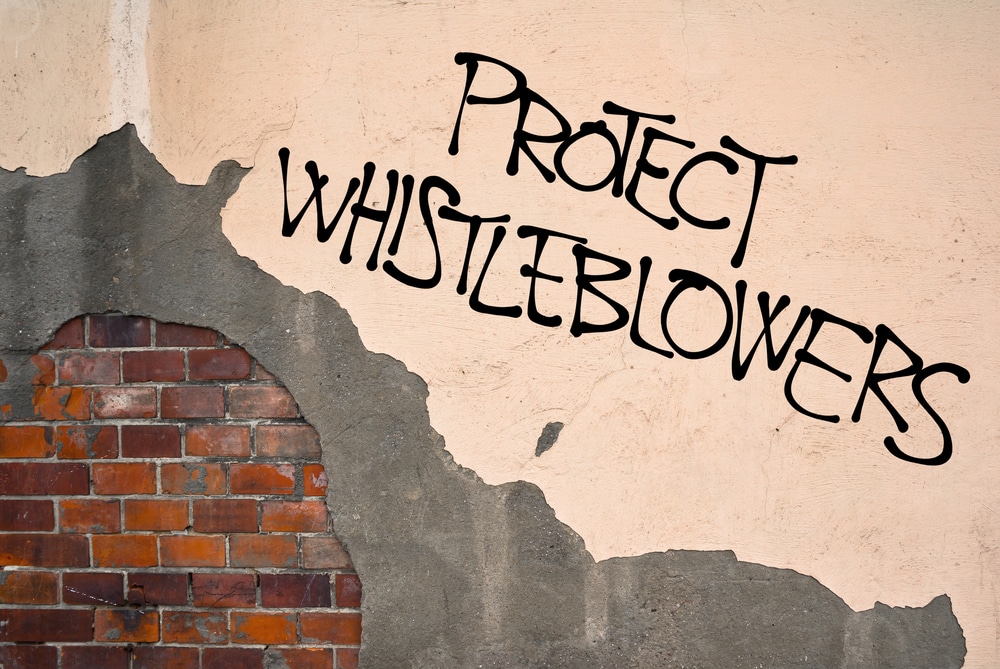In 1988 the employee rights act was amended offering greater protection in the UK for whistleblowers against discrimination by their employers. The freedom provided by the law for whistleblowers ensures that illegal and wrong activities are spotted and dealt with.

What is whistleblowing?
Whistleblowing is the act of reporting or disclosing wrongdoings to the appropriate authorities. In this instance, whistleblowing refers to an instance where an employee report wrong or illegal activities conducted by his/her employers to the appropriate authorities.
Workers concerned about the past, present, or future conduct of their employers can raise their concerns. This is also known as “making a disclosure in the public interest”
Why Whistleblowers need protection
Whistleblowers often need strong legal protection to protect them from retaliation and victimization by their employers. There is a need for employees to feel comfortable stepping forward with complaints regarding things they may have observed at work. Without this legal safeguard wrongdoing may go unreported and unaddressed.
The law’s stance on protection for whistleblowers
The Public Interest Disclosure Act of 1998 amended the Employee Rights Acts (1996), offering more protection for whistleblower. The amendment introduced offered a two staged protection. The act dictates that:
- It is unlawful for an employer to subject the whistleblower (employee) to any form of unfair or partial treatment. The amendment protects employees from all sorts of disciplinary actions what may arise as a result of the voiced complaints.
- Employees are liable to claim unfair dismissal if they are fired as a result of the disclosure. The employee’s rights to claim unfair dismissal in this situation overrides the years of service required for ordinary unfair dismissal claims.
Blowing the whistle
Employees who wish to report a malpractice or wrongdoing should follow the guidelines and procedures laid down by their employers. The earlier concerns are expressed, the easier it is for appropriate action to be taken. Although the whistle blower is not required to provide conclusive and irrevocable evidence of the wrongdoing, he/she does need to demonstrate the authenticity of the complaints.
Depending on the circumstances, employees can raise concerns with the executives at various levels of management within the organization, or to outside counsel. Concerns may be raised via telephone call and writing, however, some channels may require the reports to be made in person.
Blowing the whistle within the organization
When blowing the whistle within the organization, the concerns can be taken to any of the following persons
- Line manager
- The departmental Corporate Director
- The monitoring officer
- The Chief Executive Officer
- Human resources manager
The designations and offices may differ from organization to organization.
Blowing the whistle to prescribed persons
Sometimes, employees do not feel comfortable blowing the whistle to people within their organization, and opt to seek external advice. In this case care must be taken to make sure that the concerns are being raised to the appropriate persons or bodies about the issue.
Blowing the whistle to legal counsel
Disclosing a malpractice to legal counsel would often make the employee appropriately aware of the best ways to proceed with the complaint.
Blowing the whistle to a governmental personnel
People employed in the public sector may choose to disclose information about malpractice to a high level government personnel who can take action.
Blowing the whistle to the general public
In situations where the employee believes that the wrongdoing is an exceptionally serious failure, he/she can skip the normal channels and go straight to the public. However, in doing so, the employee must ensure that it is a genuinely serious failure, and not just a subjective judgment.
Reports that qualify as whistle blowing
Whistleblowing is protected under the law when the raised concerns fall under any of the following categories:
- Risks of actual or potential damage to the environment
- Fraud
- Misappropriation of public funds
- Public or individual health risk
- Cover ups of wrongdoings
- Any other unlawful or criminal activity
Reports that do not qualify as whistleblowing
Reports that are not in the best interest of the general public are not considered whistleblowing and thus, can make the employee liable to dismissal or other disciplinary actions by the employer. The law does not cover reports involving personal grievances like bullying and discrimination.
What to do when you are treated unfairly for blowing the whistle
Sometimes, employees are subjected to unfair treatment as a direct or indirect result of whistleblowing. These could be in any of the following forms:
- Harassment at the place of work
- Victimization from superiors and colleagues
- Disciplinary actions
- Demotions
- Denied promotions
- Denied raises and other due benefits
- Denied training and development opportunities
The employee rights acts of 1996 prohibit such treatments and affected employees can take the case to the employment tribunal. In cases where the whistleblower is subjected to a detriment by a co-worker, the employee can file a case against both the co-worker and the employer at an Industrial Tribunal
Conversely, employees dismissed because of whistleblowing qualify for unfair dismissal. Any claims of unfair dismissals must be raised within three months of the dismissal. However, if the concern was made anonymously, it may be difficult to argue that the unfair treatment and dismissal is as a result of the whistleblowing.
Employer measures to foster whistleblowing
Even though employers are not obligated to foster a whistleblowing culture, it is in their best interests to create structures that protect whistleblowers within their organizations. The structures are usually in forms of procedures that guide the whistleblower. They usually involve any of the following:
- Designating an executive who reports can be directed to
- Fostering an atmosphere where employees feel protected to speak up
- Launching prompt investigations into the disclosed issues
- Laying down procedures that employees can follow in when making a disclosure
- A clear and concise whistleblowing policy.
- Protection of the identity of whistleblowers
Policies set up by the employer can often protect them in legal cases.
Our No Win No Fee Employment Solicitors can assist with all types of claims including tribunal claims and where possible on a no win, no fee basis. Naturally, we pride ourselves on providing the best possible service to the highest standards, we offer employment law advice on all problems. Call us on 020 3923 4777 or 020 3923 4777
<<Why are UK Employees more likely to Whistleblow?>>
<<Defamation Complaint Does Not Qualify for Whistleblowing Disclosure>>
Tom Street qualified as a solicitor in 2003 and has over 20 years experience in employment and litigation law. He studied law at the University of Manchester before undertaking the legal practice course at the College of Law in Guildford, going on to complete his legal training at a firm in Chancery Lane, London. Once fully qualified, he moved to a niche litigation practice in the City of London.
In 2010, Tom set up his own legal practice, Tom Street & Co Solicitors and as part of this, in accordance with his strongly held objective to provide everyone with an easy pathway to justice he established the online portals Do I Have A Case? and Tribunal Claim. These websites are trading names of Tom Street & Co Solicitors.

